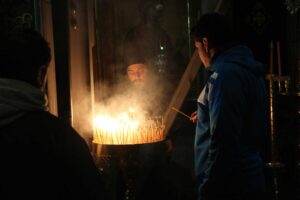Elder Anthimos on Repentance Part 2
Repentance is very easy. It lies within man’s intention. St Mary of Egypt could not enter the church in Jerusalem, because some invisible power pushed her away. As soon as she recognized her offenses, she repented. She fell on her knees; she cried and chose the Lady Theotokos as the intercessor and guarantor of her repentance. Then she got up and entered into the church, venerated the Precious Cross, and then embarked on a life of repentance and ceaseless asceticism. We people must realize and become aware that we are only dust and ashes. A moment comes when the soul is separated from the material body, and this fear of perceived death startles people and leads them to repentance. Confession follows after this. The All-Good God did not appoint Angels to accept the errors of men. He appointed people who suffer the same things, bishops and priests, who are successors of the Apostles. The Apostles of Christ received all authority as He told them, ‘As the Father sent me, I also send you’ (John 20:21). Once He breathed on them, He continued, ‘Receive the Holy Spirit. Whosesoever sins you remit, they are remitted to them. Whosesoever sins you retain, are retained’ (John 20:21-23).The Holy Apostles passed on this authority of remitting sins to their successors, and they subsequently passed it down to Orthodox priests who are Father Confessors, and they will pass it down to the close of the ages.
Man’s disposition, as we mentioned, is the power of the soul which dominates the body, and of the body which follows the soul. For this reason, if they transgress, both the soul and body will be condemned in eternal hell.
– Elder Anthimos of St Anne’s
